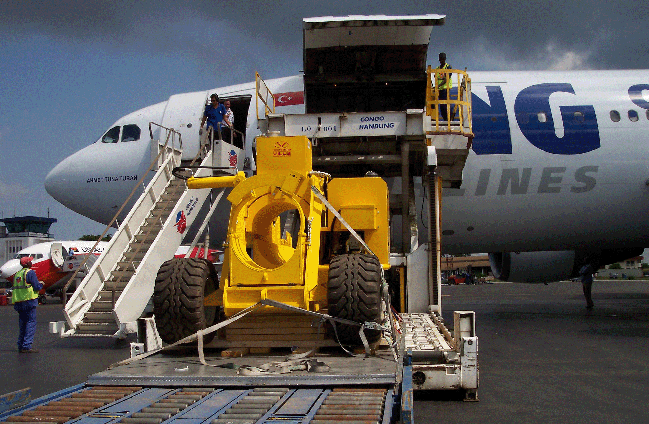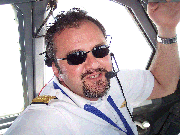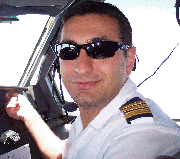Africa
Safety Blues
  “There
still are a lot of safety challenges in African aviation,” Teoman
Ceylan, (left) the Captain of the Airbus A300B4 freighter “Ahmet
Tuna Turan” of Turkish MNG Airlines says. “There
still are a lot of safety challenges in African aviation,” Teoman
Ceylan, (left) the Captain of the Airbus A300B4 freighter “Ahmet
Tuna Turan” of Turkish MNG Airlines says.
From the appearance of things the good captain
knows what he’s talking about. Since weeks he and First Officer
Okan Ergene (right)have been flying all over West and Central Africa on
behalf of Togolese carrier Africa West Cargo that has been wet-leasing
the Turkish freighter.
We are flying into Pointe Noire, a Congolese
city on the Atlantic coast. There, the oil and mineral industry is constantly
getting new machines, tools and equipment to continue their work. “We
take over these goods at Lomé Airport from Africa West Cargo and
fly them at least once a week to Pointe Noire,” Captain Ceylan says.
A routine job for captain and crew save
for the occasional human element of people crossing unabated both runway
and taxiways at the airport.
“People are constantly crossing the
tarmac or the runway anytime they feel like it and sometimes there are
even private motorcycles zipping up and down on the runway,” Ceylan
says.
The reason that kind of activity is taking
place is self-explanatory, just looking around the facility.
Pointe Noire Airport is not fenced in and
no one from the local authority seems to be bothered about any pedestrians
or cyclists using the facility for a short cut or a ride. In fact there
is even a local market next to the runway with people constantly coming
and going.
Pointe Noire is only one of the many African
airports where safety and security matters are handled without much care.
Brazzaville or Kinshasa are other places that have no fence up to now.
“It’s not only humans but animals, too, that endanger air
traffic by sometimes crossing the runway,” complains Captain Ceylan.
Of more concern however, is the old-fashioned
communication system in many African areas since there is a complete lack
of ground radar control of any flights. “What we do is that we pass
on our flight data, routing and position to the ground stations. Then,
they compare this given information with messages they received from other
aircraft to see whether the planes in their airspace are probably cruising
on a colliding course. It’s an awkward and outdated flight management
system that does not make pilots feel very comfortable,” confesses
First Officer Okan.
As a positive example of an overall well
functioning airport he mentions Lomé Gnassingbé Eyadéma
International. “They do have a fence
all around their facility and all cargo shipments are x-rayed before being
loaded on board of an aircraft.”
  “This
makes Togolese Lomé one of the most secure places for air freight
in West and Central Africa,” says Aero Cargo’s General Manager
Nouri Tiedke, (left)Africa West Cargo’s GSSA in Germany. The Lomé-based
airline operates one B747-200F from U.S. lessor Southern Air, the above
MNG A300B4 freighter and two Antonovs 12F from a provider of Sao Tome
Island. “This
makes Togolese Lomé one of the most secure places for air freight
in West and Central Africa,” says Aero Cargo’s General Manager
Nouri Tiedke, (left)Africa West Cargo’s GSSA in Germany. The Lomé-based
airline operates one B747-200F from U.S. lessor Southern Air, the above
MNG A300B4 freighter and two Antonovs 12F from a provider of Sao Tome
Island.
Meanwhile the African nations have started
discussions for enhancing security and liberalizing aviation matters.
“Our aim is to create one single African sky that should be functional
by 2015,” announces Jean-Paul Libelele Momboyo Kukuta (right). The
Libreville, Gabon-based expert for transport infrastructure was one of
around 50 delegates who participated recently at a meeting in Lomé
for improving air freight transports in West- and Central Africa.
One common goal is to put fences around
the international airports and ban aging and polluting freighters like
the AN-12, B707F or Lockheed 1011 from the sky. Some states have already
commenced the grounding of these planes, including the Democratic Republic
of Congo, Tanzania and even Nigeria.
“Model for our roadmap to less emissions
and better security is the European Union with their high environmental
and safety standards in aviation,“ Libelele says.
By adding that Africa is extremely dependent
on air transports since many roads are poor and railways often do not
exist. “That leaves planes as the only means to connect the centers
with their hinterlands,” the expert emphasizes.
Heiner Siegmund
|

